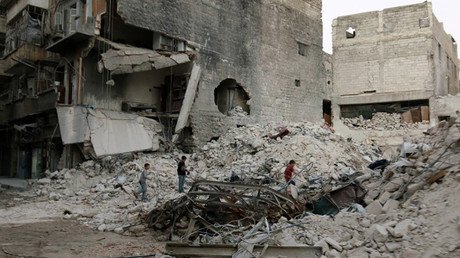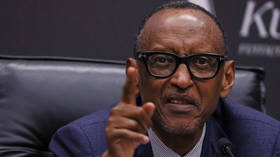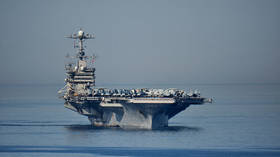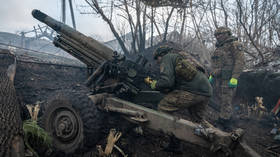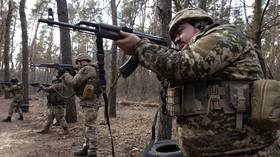Why Russia can't rely on US as partner against terrorism in Syria
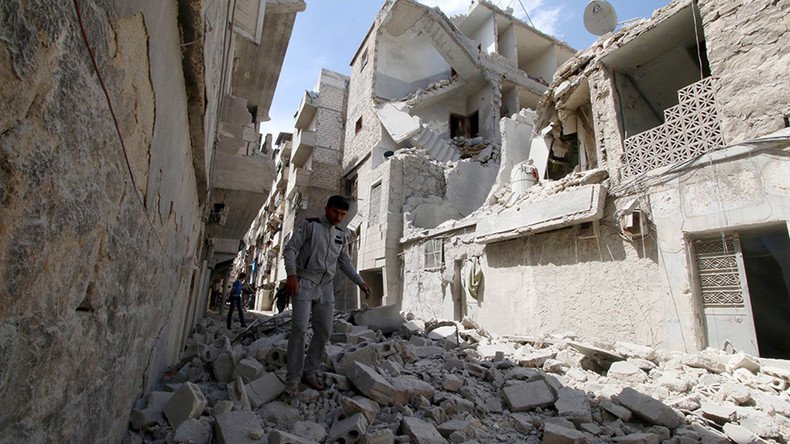
When analyzing the conflict in Syria there is a danger of lapsing into the mistake of treating it in isolation, thereby losing sight of its wider geopolitical and global context.
Do so and you risk becoming part of Washington’s game, in which the conflict is reduced to an evil dictator, Bashar al-Assad, killing and massacring his own people. In this endeavor he is being ably supported by big bad Russia, a country of 145 million people that is led by a government with no respect for human life, so the story goes.
Resisting them, meanwhile, are courageous and freedom-loving ‘moderate rebels’ – the kind that film themselves beheading 12-year Palestinian children. These so-called moderates enjoy the support of the West, led by Washington, that beacon of civilization, human rights and democracy whose growing involvement in the conflict is necessary to protect innocent human life.
This, in sum, has been the narrative of the conflict presented to the world by Western governments, and eagerly and unquestioningly echoed by a compliant mainstream media. It is a narrative so utterly grotesque in its distortion of reality it is beyond parody.
Thucydides sets out doctrine of ‘might is right’
The Athenian historian and military leader, Thucydides, in his classic account of the Peloponnesian War involving Athens and Sparta (431-404 BC), elucidated the doctrine of ‘might is right’ with such clarity and cogency it has yet to be surpassed. In the part of his book known as the ‘Melian Dialogue’, he describes the encounter between the leaders of an Athenian fleet and envoys representing the people of Melos, whom the Athenians had demanded must submit to their rule on pain of death and destruction of their city.
In explaining why the Melians should submit, the Athenians told them,“right, as the world goes, is only in question between equals in power, while the strong do what they can and the weak suffer what they must.”
US strategic objectives enshrined in PNAC
“The strong do what they can and the weak suffer what they must.” This simple sentence provides us with a precise and succinct rendering of US foreign policy since the Soviet Union was consigned to history in the early 1990s. It was a policy set out in the Project for a New American Century (PNAC) by a group of leading neoconservatives in 1997, one that can be summarized in one sentence: War without end in service to US global domination and leadership.
In this regard it is wrong to confine Washington’s objective of the entrenchment of US global hegemony under its unipolar leadership to the neoconservative wing of its political class. Both Republican and Democrat administrations are committed the maintenance and entrenchment of US power and leadership globally. In this regard the Middle East has long been viewed as crucial.
Charles W Freeman, former US ambassador to Saudi Arabia, writes: “The Middle East matters. It is where Africa, Asia and Europe converge. In addition to harboring the greater part of the world's conventionally recoverable energy supplies, it is a key passageway between Asia and Europe. No nation can hope to project its power throughout the globe without access to and through the Middle East. Nor can any ignore the role of the Persian Gulf countries in fueling the world's armed forces, powering its economies and setting its energy prices. This is why the United States has acted consistently to maintain a position of preeminent influence in the Middle East and to deny to any strategically hostile nation or coalition of nations the opportunity to contest its politico-military dominance of the region.”
The major foreign policy objective enshrined in PNAC was the overthrow Saddam Hussein. By the time the opportunity to put this goal into operation came in 2003, utilizing the anger, fear and confusion wrought by 9/11 in order to gain the support of a large section of the American people for going into a country that had nothing do with the terrorist attack, Iraq and its people had been starved as no people ever have by thirteen years of economic sanctions that plumbed the depths of medieval cruelty and barbarism.
The impact of the sanctions on Iraqi society made the country, in the thinking of US neocons, ripe for invasion, occupation, and subjugation as part of a military campaign to reshape the Middle East in service to US strategic objectives, unleashed under the smokescreen of promoting democracy and human rights. With the region swimming in oil, it had to be brought until Washington’s control in the form of the replacement of oppositional and independent governments with pliant, pro-Washington alternatives, exploiting the lack of a Soviet geopolitical and military opposition to do so.
Consequently, Iraq, Syria, and Iran were placed in the cross hairs of plans for regime change by the US, urged on if not aided by its regional allies – Saudi Arabia, Israel, Jordan, Qatar, and Egypt under Hosni Mubarak.
US ability to control Middle East weakened
The cost in blood and treasure expended by Washington as a result of its attempt to utilize hard power in reshaping the region after 9/11 ended in military defeat both in Afghanistan and Iraq, leaving the US military weakened and exhausted. More importantly, it has had a negative impact on American public opinion when it came to support for foreign wars, leaving Washington discredited as a result.
In Iraq, resistance to US occupation gave way to the emergence of a modern incarnation of the Khmer Rouge, beginning life as al-Qaeda in Iraq (AQI), before morphing into the Islamic State in Iraq (ISI), and subsequently expanding into Syria to become ISIS.
The role of oil
Securing domestic oil supply is not a key focus of US strategic thinking towards the Middle East in 2016, and indeed nor was it back in 2003. Back then, over half of US oil imports were from the American continent and Africa, and since then the development and growth of the fracking industry in the US has significantly reduced its reliance on oil imports overall. However the ability to control the energy supplies to rival emerging economies, China, India, etc., was a major strategic objective. Within that the control of energy trans-shipment routes, pipelines, is also key to the ability to any hegemonic agenda.
In addition, retaining close relations with the Saudis had been a priority in Washington since the oil shock of the early 1970s, when the then Saudi leadership cut production in protest at US support for Israel during the October War (referred to in Israel as the Yom Kippur War), and sent global energy prices skyrocketing, plunging the US and other major Western economies into recession. What better way to ensure that nothing like it ever happened again than by establishing a significant US military presence in the region, just in case the close relations between both countries were to end or change? This, to be sure, was another objective of the projection of US hard power into the region after 9/11.
When the Obama administration came to power in 2008/09, it did so placing a priority on extracting US military forces from Iraq and Afghanistan, whose deployment by then was unsustainable in light of the a global economic crash resulting from the bursting of a giant debt bubble within the US, created by the country’s unsustainable levels of consumption.
Obama’s retreat and the Arab Spring
Obama’s retreat from a region its predecessor had destabilized and turned upside down, combined with the socioeconomic impact of the aforementioned global economic crash on economies that were already weak and vulnerable to economic shock, created the perfect storm when it came to the 2011 social explosion commonly referred to as the Arab Spring.
Initially a broad-based and progressive mass movement when it swept pro-Western dictators Ben Ali and Hosni Mubarak from power in Tunisia and Egypt, by the time it reached Libya in February 2011 it had run out of steam, lacking the popular support of the Libyan masses to make it anything other than an uprising confined to the country’s eastern city of Benghazi, already a base of radical Islamism within the oil-rich North African state.
NATO’s air campaign in Libya was undertaken with the goal of ensuring that the West found itself on the winning side. Western governments had pre-existing oil contracts to protect, and on a regional level it could not afford to allow control of a region it considered its domain to escape its influence in a period where Russia had re-emerged as a strong strategic counterweight to Washington’s unipolar status. This it had done in conjunction with China’s continuing economic growth and, with it, assertion of its own security and strategic interests not only in the Asian Pacific but also across the Global South, where it has gone some way in recent years to replacing Washington and Washington-controlled global financial institutions – the World Bank and IMF – as the major source of investment and development.
Birth of a multipolar world
When Russian President Vladimir Putin addressed the 70th General Assembly of the United Nations in September 2015, days prior to the start of Russia’s participation in the conflict in Syria at the request of the country’s government, he effectively announced the birth of a multipolar world after decades during which US hegemony had proved disastrous in terms of sowing instability, crises, and conflict in the Middle East and elsewhere.
The protraction of the conflict in Syria is entirely due to the refusal of the US to stem, from its regional allies, the flow of weapons and money to an opposition dominated by Salafi-jihadists, thus exposing Washington’s determination to resist the loss of a region it still considers should be under its domain. In this wider context the battle for Aleppo, rightly described as Syria’s Stalingrad, is seminal. It is why we have witnessed the ramping up of anti-Russian and anti-Syrian propaganda in recent weeks.
It is also why neither Russia nor Syria has a serious partner when it comes to a negotiated settlement.
The statements, views and opinions expressed in this column are solely those of the author and do not necessarily represent those of RT.

